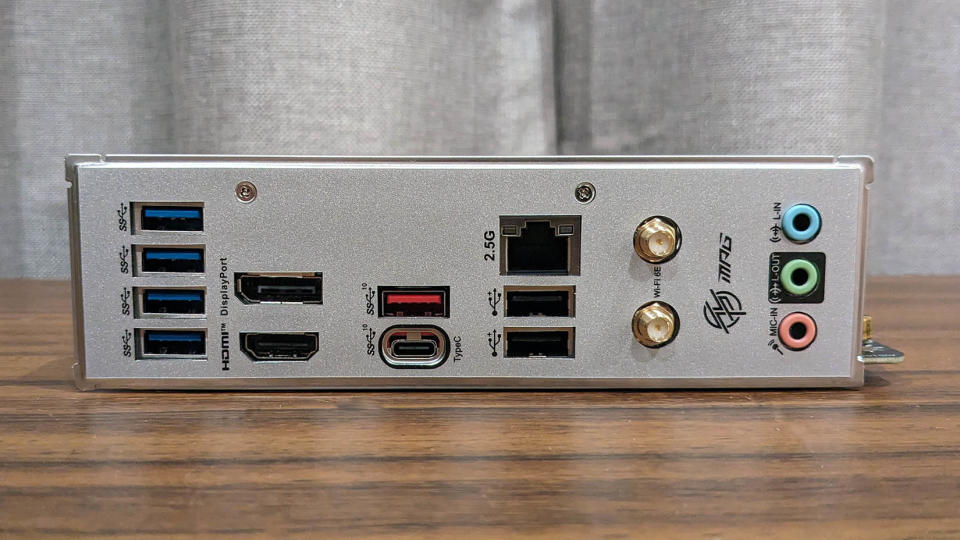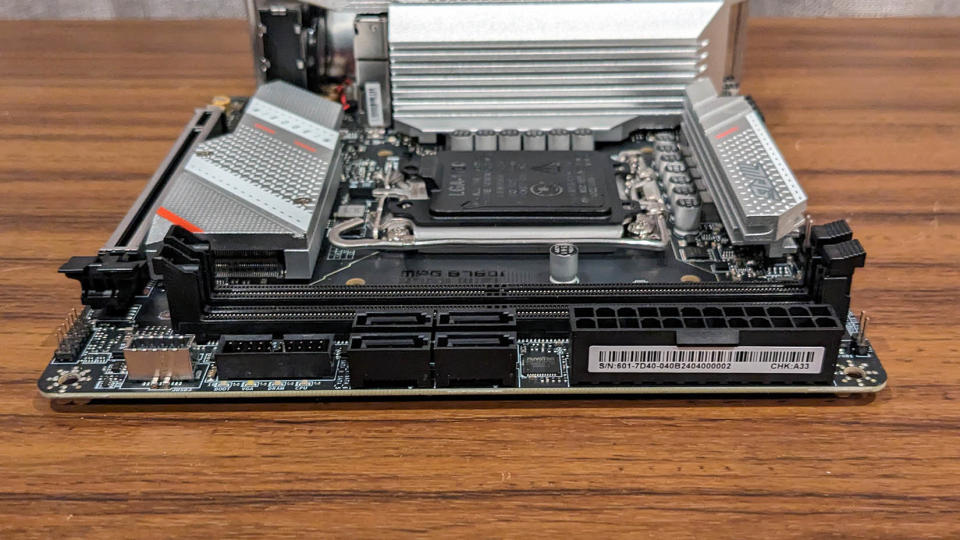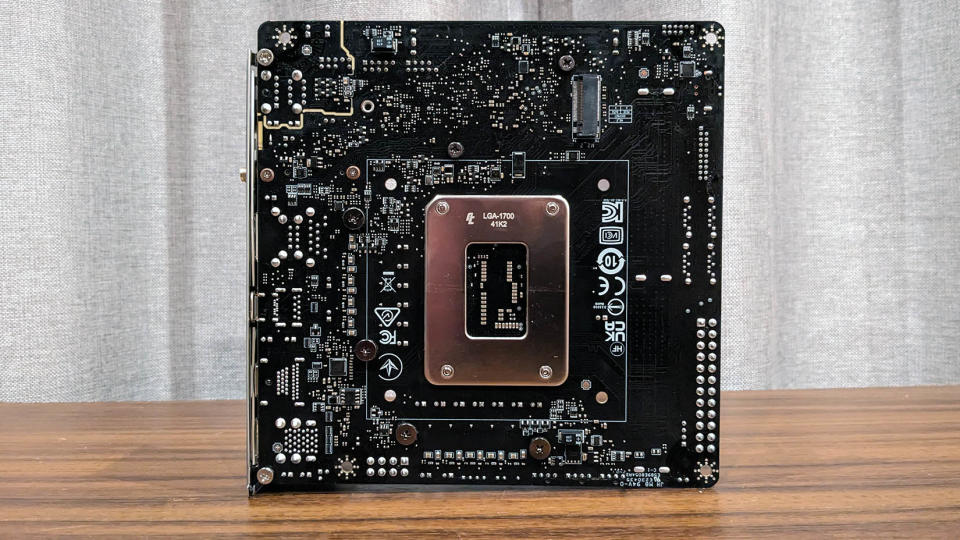Back in the day, Intel’s B-series motherboards were very basic indeed. A few generations ago they couldn’t even overclock the memory. But they’ve come a long way, and today they’re generally perfectly viable options, even with a high-end K-series processor. Well, a lot of it anyway… cheap is still cheap.
The B760I Edge WiFi isn’t too expensive an option, although competition in this price range is fierce.
The MSI B760I Edge WiFi is positioned as an affordable board with a decent mainstream feature set. It’s a Mini-ITX motherboard, so it should be a good option for those looking to put a little more money into a better graphics card or CPU for a compact, yet highly capable small form factor system.
At $205 / £199 / AU$349, the B760I Edge WiFi isn’t too expensive an option, although competition is fierce in this price range, with Mini-ITX options from ASRock, Gigabyte and Asus all priced similarly. As a Mini-ITX board you’ll face a few sacrifices compared to ATX options, but that’s par for the course.
I’d say the B760I Edge is an attractive board. It’s similar in appearance to its AMD-bearing MPG B650I Edge sibling, though thankfully it lacks that board’s chipset fan. The silver-on-black theme would look good with the right matching components, that is if you can see it in a small case at all. It also lacks onboard RGB, although it does have RGB and ARGB headers. I imagine it would look great in a white case.
MSI MPG B760I Edge WiFi Specifications

Wall outlet: Intel LGA1700
CPU Compatibility: Intel 12th, 13th and 14th generation processors
Form factor: Mini ITX
Memory Support: DDR5-7200+(OC), up to 128 GB
Storage: 2x M.2, 4x SATA
USB: Up to 3x USB 10Gbps, 6x USB 5Gbps, 4x USB 2.0
Display: 1x HDMI 2.1, 1x DP 1.4
Networks: Realtek RTL8125BG 2.5G LAN, Intel WiFi 6E
Audio: Realtek ALC897
Price: $205 / £199 / AU$349
Expectedly, at this price, MSI hasn’t pulled out all the stops when it comes to a mega VRM and ultra-fast memory support. It can happily run DDR5-7200 memory, with support up to 128 GB. That’s enough for any gaming system.
It has an 8+2+1 phase VRM with 90a stages. That’s not extreme, but it’s enough to handle an i9 processor at full power. The heat sinks do a great job of keeping things cool, as long as you have decent airflow in your case. It’s worth remembering that some ITX cases aren’t great in that regard due to their compact nature.
The primary PCIe slot supports Gen 5, while in terms of storage you get a pair of M.2 slots, both of which support Gen 4 SSDs. The one on the front is connected to the CPU, while the one on the back of the board is connected to the chipset. They are accompanied by four SATA ports. That’s about as good as it gets for a B760 Mini-ITX board.










The rear I/O has some highlights, but there is also one notable omission. It’s disappointing not to see a BIOS flashback feature. So while 12th and 13th generation processors are supported natively, depending on how long your particular one has been waiting for you, it’s likely you’ll need to flash it with an older CPU to get support for a 14th generation model. take it home.
The USB complement consists of eight ports consisting of USB Type A and C 10Gbps ports, four 5Gbps ports and two USB 2.0 ports. A 20Gbps port would be nice, but eight USB ports is a solid number for any Mini-ITX board. The USB ports are joined by DisplayPort and HDMI 2.1 ports, with three 3.5mm analog jacks connected to a legacy ALC897 codec. A Realtek RTL8125BG offers 2.5 Gbps Ethernet and there are two Wi-Fi antenna connections for the built-in WiFi 6E.
System performance
Game performance
Test setup
CPU: Intel Core i9 14900K
Pictures: Nvidia GeForce RTX 4090 Founders Edition
RAM: 2x 16GB G.Skill Trident Z5 DDR5-6000 C36
Storage: 2TB Kingston KC3000
Cooling: CoolerMaster PL360 Flux 360mm AIO
Power supply: Corsair HX1000i
For this review we stuck with a reliable Intel Core i9 13900K. Aside from the even more demanding i9 14900K, the fact that the B760I Edge WiFi can handle this chip without the VRM getting very hot is a good indication that the board can handle any realistic workload you want to throw at it. Ideally, though, you’d want a good high-airflow enclosure if you go that route.
The small MSI provided no surprises in the benchmark tests. That shouldn’t happen, nor should any LGA 1700 motherboard in 2024, as the underlying microcode and bugs have been fixed long ago.
Buy as…
✅You want a white-themed build: The Edge is a stylish looking product that fits well in a white casing with the right matching components.
Don’t buy if…
❌ You want 20Gbps USB support: 20Gbps isn’t ubiquitous in this price range, but it does exist. In any case, the MSI has eight USB ports on the back, while some competitors only offer six.
❌ You simultaneously buy a 14th generation CPU: The Edge will support 14th generation processors, but only after it will likely need a BIOS flash. You will need an older generation CPU for this due to the lack of a BIOS flashback feature.
The MSI MPG B760I Edge proved itself as a capable little board. I’ve always liked the layout of MSI’s UEFI design and it has a reasonable VRM for a B-series Mini-ITX board. The heatsinks are better than fair, the networking and storage complementation is about as good as anything in this price range, and you’ll have to go with ATX if you want more storage capacity.
Perhaps the biggest problem the Edge faces is strong competition. The newly released ASRock B760I Lightning supports 14th generation chips as standard, and the VRM and memory support are also superior. The nice thing is that it’s at least $20 cheaper.
But the MSI B760I Edge is far from a bad board. It will happily live at the heart of a compact gaming system. It’s mature and it looks good. It just lacks something that would give it an edge over the competition. If MSI were to drop the price a bit, or if it goes on sale, definitely buy one. But now that the LGA 1700 is nearing the end of its career, there are more attractive Mini-ITX options to choose from.